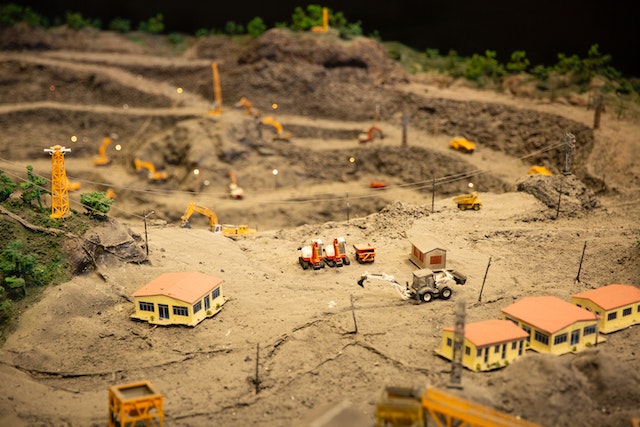Ah, the joys of being a landlord. There’s nothing quite like the feeling of owning a commercial property and watching your tenants pay rent on time, every time. But how do you determine the right amount to charge for your property?
After all, you don’t want to set the rent too high and drive tenants away, but you also don’t want to leave money on the table. Fear not, my friends, for in this blog post we will discuss the ins and outs on how to determine the right rent for your commercial property. So sit back, relax, and let’s get down to business.
Do Your Homework

If you’ve found yourself trying to determine the right rent for your commercial property, you better do your homework! It’s not something that you want to mess around with. First and foremost, you need to understand the local area and you can do that by doing some research. Go online and poke around to learn the basics of the local economy. Get a feel for businesses that are doing well or maybe businesses that are slowly dying off. Whatever it is, it will tell you about the area and it’s worth taking the time to investigate.
Once you’ve gotten comfortable with the area, you should then go and check out some properties that are similar to yours. This can range from size, age and even location. Take notes on what tenants are asking for rent, the condition of the property and the length of the lease. This is all important information you can use to determine what you should ask for rent.
The next step after you’ve done your homework is to determine what you need. For example, you need to consider the size of the building. That will give you an area to work with and you don’t want to ask for too little rent or too much rent. Next, you should also consider any kind of amenities or utilities that might help push up the rent a bit. For example, if there happens to be air conditioning, that’s a nice bonus for tenants, so you can ask a little more for rent.
Now once you’ve got an idea of what to charge for the rent, you should understand the costs that come with it. This includes tenants’ fees that you might have to cover, such as key deposits and any other kind of fees. You’ll also want to consider property taxes. That’s something you need to decrease, not increase, so make sure you know this number. Likewise, there are also maintenance costs. The last thing you want is to get stuck with an expensive repair bill!
Finally, it’s time to set the right price. To do that, you need to do market research and make sure the asking rent is in line with the area and other properties. You also want to make sure you leave some room to “bid high but fair” when it comes to negotiations. While you don’t want to gouge potential tenants, you also don’t want to leave money on the table either.
To sum it all up, determining the right rent for your commercial property involves doing your homework. Take the time to research the area and consider your options. Understand all the costs and set a price that is fair for both parties. As long as you take your time and keep a level head, you’ll be able to get the rent you deserve!
Research the Area
When it comes to finding the right rent for your commercial property, the first step is to do your due diligence. That means it’s time to do some research. And when we say research, we mean real, quality research. You’ll have to go beyond a simple online search and look into all the nooks and crannies of the real estate market in your area.
So let’s talk about researching the area. First and foremost, you’ll want to check the local news to see what’s happening in the area. Is the city investing in new amenities? Is there a new road going in? The answers to these questions can tell you a lot about what kind of businesses and renters may be interested in your area in the near future.
Once you’ve got the news about the area, it’s time to hit up the local government. See what kind of zoning codes and restrictions apply, as well as what sort of development is planned or in progress. This will give you an idea of what kind of tenants you may be competing with in the future.
Finally, you’ll want to check out what’s happening with your competition. See what they’re renting and at what price. You’ll have a better idea of what the local market’s willing to pay for a space like yours. Just don’t be surprised if you end up facing some stiff competition.
At this point, you should have a pretty good idea of the rental market in your area. Now, it’s time to start considering what your space needs for potential renters. So, hang tight and we’ll go over that in the next section.
Check Out Similar Properties

When it comes to pricing the right rent for your commercial property, the best place to start is by checking out the rent prices of similar properties in the area. This isn’t as simple as it seems, though – you’ll really have to get into the nitty-gritty details. You may have to do some digging and get creative. It also helps if you have an insider’s perspective or access to confidential information, because there’s no better way to determine the right commercial rent price than by seeing what other properties are charging.
For starters, you can start off by asking the landlords of similar properties yourself, but chances are they’re not going to give up those secrets quite that easily! You’ll need to take a look at their listings and other sites to see what kind of rental prices they’re advertising. You’ll be able to see the rental prices for similar properties, as well as the prices for utilities, amenities, and other services that may be included.
You can also research the sites of local real estate companies and inquire about their listings to get an idea of the market rents in the area. Additionally, you can search public records to find out what the past and current rental prices are, which can give you a better understanding of the changing trends in the local market.
Lastly, don’t forget to look more broadly, too. If you’re doing the research yourself and not using an agent, you can use the internet to do some more market research. Poke around online and see what other similar properties are charging. Search for news articles and public data from the local government and even universities. By looking a bit further, you’ll be able to get a better understanding of the local market.
Don’t forget to also keep an eye out for any competitors that may be leasing out similar properties in the area. This is an easy way to see what kinds of pricing strategies your competition is using, so you can know exactly what market rents you should be striving for.
And voila! Obtaining the fair market rent of your commercial property doesn’t have to be such a difficult task, as long as you do your research. But of course, it always helps to have an expert’s opinion, since they’re usually the ones with the insider’s edge and access to confidential information. Understanding the current rental prices in the area is key to making sure you’re getting the right rent for your property.
Determine What You Need
When it comes time to determine the right rent for your commercial property, it’s important to first figure out what you need from the tenant. That means taking stock of the size, layout, and condition of the property.
It’s important to get as specific as possible with your needs, as this will make your life easier when it comes to signing a lease agreement. For example, if you want the tenant to handle utilities and amenities, make sure you set this out in the agreement.
Let’s take a closer look at some of the things you need to consider when figuring out what kind of tenant you’re looking for. The more specific you can get, the easier it will be to secure a tenant.
When it comes to building size, you’re going to need to consider how much space you’re providing and whether it’s suitable for the tenant’s needs. Do you have enough parking? How are the accessibility features, such as wheelchair ramps and lifts? Will you be able to provide the full range of necessary amenities, such as restroom facilities and kitchen spaces?
Another element to consider is the utilities and amenities that you’ll be able to provide. Are the plumbing and electricity up to code? Are the heating and cooling systems sufficient? If the tenant is responsible for their own utilities, how much of a break can you afford to give them?
It’s also important to consider any special needs that the tenant might have. Could you provide an acceptable space for disabled tenants? Do you provide emergency services or special accommodation? These are important questions to ask before you sign a lease agreement.
Knowing what you need and what you’re willing to provide will make it easier for you to determine the right rent for your commercial property. Once you have a firm handle on your needs, you can move on to understanding the costs associated with renting out the property.
Consider Building Size

When you’re looking to determine the right rent for your commercial property, you have to consider different factors, starting doing your homework. In this case, what we need to do is to consider building size.
This means that you will have to take a moment to look at the size of your building. That’s a vital consideration if you want to get the right rent for your property. You could have a huge building but no one is going to rent it if it doesn’t have the space they need. The amount of space you’re offering will determine the monthly rent you can charge for your space.
If your building is spacious, you may want to add a bonus room, like a lounge or game room, as an extra asset and bonus for your potential tenants. That will help you make more money. Now, if your building isn’t huge, you should definitely be realistic and don’t try to fit everything in one unit because that just won’t work!
Now, if you need to determine the rent for bigger commercial spaces, you need to consider what type of businesses will use the space. You might have to measure the length and width of the area, as well as the height of the ceiling. There’s nothing wrong with being precise.
Size – and the layout of the space – obviously affects the amount of money you can charge for your property. So, you should be realistic and understanding when it comes to the demand for your space and the rent you can charge. Also, you should think about the best way to divide your commercial space – that could really make a difference in the rent you charge.
In any case, you should think about your building in a creative way. Whether it is small or large, think of how it can best be used and how many tenants can fit in comfortably.
Remember that size matters, it affects the way your tenants use the property and the rent you can charge. You should do the math and pay special attention to the measurements of your property if you want to determine the right rent for your commercial property.
Now, let’s move on and consider other things to make sure you get the rent you deserve!
Consider Utilities and Amenities
Ah, the amenities. The stuff that will make your commercial property more attractive to your prospective tenants. You might be wondering what kind of amenities to include in your rent package… well let me fill you in!
The basic amenities will vary based on what type of commercial property you own, but the general idea is that you have all the necessary elements of running a business. This means having adequate electric and internet connectivity, waste management, and cleanliness to provide a comfortable working environment.
The next step is the “nice-to-haves” – those items that make a building stand out from the competition. Some common amenities in commercial properties include extra storage areas, conference rooms, computer networks, boardrooms, and fitouts. Other extras like outdoor seating, meeting rooms, gyms, cafés or restaurants are always a plus. You might even want to consider having a reception area for your tenant’s customers.
If you’re particularly eager to set your rental package apart from the rest, you might want to consider providing extra amenities such as access to office cleaning and maintenance services or a staffed reception center. Of course, you’ll need to raise your rent for such features, but that depends on the value of service you provide.
Utilities and amenities can be a game changer in the commercial real estate market, so do your best to stand out. The more attractive your property is, the more you can charge – this why it’s important to get the fundamentals right and think strategically when it comes to amenities. Make sure you factor in all the related costs and be prepared to negotiate. With the right utilities and amenities, you’ll be able to set the right price for your commercial property. Good luck!
Understand All the Costs

If you are considering leasing out your commercial property, it is important to understand all the costs that come with it. Let me tell you, it can be quite a bit. Renting out a property is not as simple as taking cash and letting people move in; there are plenty of other fees and taxes to factor in.
First, you need to consider the tenants’ fees. This is the money that they will pay you when they rent the space. It should turn into a steady source of income, but it is also important to remember that this fee is not set in stone and it can change depending on a variety of factors. When setting your price, make sure it is high enough to make a profit but not so high that it becomes unrealistic for potential tenants.
Second, you have to think about property taxes. This can be a huge expense, so it should not be overlooked. Depending on the location of the property, you may have to pay some pretty hefty taxes. Make sure to include this cost when doing your calculations and setting your price.
Lastly, you need to consider the cost of maintenance. This includes day-to-day stuff like repairs, cleaning and upkeep. It is important to budget for these things because they will ensure that the property is habitable and nice. A well-maintained property will bring in more money than a poorly maintained one.
In conclusion, there are a lot of costs that come with renting out your commercial property. It is important to do the proper research and factor in all the costs before setting your price. Remember, the right price is one that is fair and brings in a profit. Good luck!
Tenants’ Fees
Hey, everybody! I’m here and you know I’m the expert on all things to do with commercial property. Did you recently purchase a commercial property, or are you thinking of doing so? Well, you need to know all the costs that come along with it—including tenants’ fees.
Now some people might not like this part and go, “Aw, why do I have to pay for this on top of the rent? I just want my property to be rented out already!”
Hey, I get it and I’m here to tell you, it’s actually better for the tenant that you’re in charge of those fees. They’ll want to get the best deal on their place and it makes more sense for them to negotiate with the landlord and figure out who pays what.
Tenants’ fees include things like security deposits, the cost of any specific lease agreement fees, or payouts to the tenant’s lawyer or real estate agent. These fees are typically due at the start of the lease agreement. They are often expected of the tenant because the owner has already paid for legal fees, titles, registrations and a lot of other costs.
The security deposit is a major part of the tenants’ fees. It’s usually equivalent to one-month’s rent and it’s paid to the landlord, who will hold it until the end of the lease term. During this time, if the tenant fails to hold up their end of the deal, like paying rent, the landlord has the right to withhold the security deposit or even ask for an additional payment to cover their losses.
At the end of the lease term, the security deposit should be returned to the tenant, minus any deductions for damage or unpaid rent. As a landlord, you should have a clear and detailed Security Deposit Law that outlines the procedure for collecting and releasing the security deposit when the lease ends.
That’s it everyone! Determine what you need and what the tenant is willing to pay before you even start looking into the tenants’ fees. It’s important to be aware of all the related costs so that you can be realistic in your rent negotiation.
There you have it, everyone. As always, rent your space with success in mind and you’ll be just fine.
Property Taxes
As a property owner, one of the most important things you need to consider when determining the right rent for your commercial property is taxes. This number can vary greatly, depending on the area in which you are operating, so it is important to do your research in order to understand what taxes you will be responsible for.
Property taxes typically need to be paid in advance, which means that you will need to understand what your taxes will be before you can set a fair rent price. Property taxes are effectively a form of local taxation and are derived from the value of the property itself. This means that the more valuable the property is, the higher your tax will be.
When conducting your research on property taxes, also make sure you understand any incentives or deductions that may apply in your local area. For example, some states and municipalities offer tax breaks for small business owners and owners of commercial properties, so make sure you understand these to ensure that you don’t pay more than you need to.
If you forget to budget for property taxes or to account for changes in local tax initiatives, you could end up short-changing yourself in the long run. Therefore, it’s important to take property taxes into account when setting the right rent for your commercial property.
Now, I know what you’re thinking: I hear you talkin’ ’bout taxes, and I’m just like “Why can’t I have more money in my pocket, instead of the government’s pocket?”. Hey, I get it. Taxes are the worst. But, the thing is, without taxes, our country wouldn’t run so smoothly. So, the next time you are calculating property taxes, just remember, you’re doing your part to help keep the nation great.
Maintenance Costs
Ah, maintenance costs… We all want our properties to be kept up, looking cool and spiffy, so they can attract good tenants, right? But maintenance costs can really bust your budget. Fortunately there are things you can do to make sure you don’t overspend.
First, it’s important to understand that maintenance work is ongoing. This means you need to plan for it, knowing it will continue for years. To prepare for this cost, set aside money from your budget each month to cover maintenance and repair costs as they arise.
Second, when emergencies such as plumbing or electrical breakdowns or weather damage occur, you should always contact a professional to make repairs. Yes, I know the idea of saving money by “Doing it yourself” is tempting, but unless you really know what you’re doing, avoid it. DIY repairs usually cost more in the long run, and often result in additional damage to the property.
Third, remember that contracts matter. If you plan to enter into a contract with a service provider or maintenance company, or even with an independent contractor, make sure to read all the details. You’ll want to know what they’ll do and when, and be sure to understand all fees involved before signing and delivering payments.
Finally, don’t let maintenance and repair costs overwhelm you. With proper planning and attention to detail, you can protect your investments, maintain their value over time, and attract quality tenants. Now that’s a win-win situation!
Set the Right Price

Ah yes, getting to the meat and potatoes of this article – setting the right price for your commercial property. Let me break down the steps for you, so you can maximize your rental income and avoid spending all your rent money on avocados.
First, you must do some market research and look into the average rental rate and potential demand in the area. You should also get familiar with the amenities offered by the other similar properties and use that as a reference when setting your price.
It’s important to keep one thing in mind – bid high but fair. You want to get the most out of your venture, but you also don’t want to scare potential tenants away. You don’t want to bid too low and miss a golden opportunity either. So find the right balance there.
Finally, when it comes time to negotiate the rental price, be sure to keep two things in mind. First, keep an open mind. Things can change quickly, and you need to be prepared to adjust your price if necessary. Second, you need to be realistic about your expectations and make sure the tenant is getting a fair deal.
Yes, determining the right rent for your commercial property can be a tricky endeavor. Do your homework and understand the costs and potential demand, and you’ll be set. With the right price, you’ll find the perfect tenant to suit your needs.
Do Market Research
Are you ready to set the right price for your commercial rental property? Alright then let’s dive right in – time to do some market research!
Before you set the rent, take a look at what other properties in the area are charging. You can get a good sense of the market in your area by visiting a few “Looking for Rent” websites, or by checking out the local paper for listings. This can give you some idea of the price range other owners in your area are charging, as well as which amenities are desirable.
If you’re feeling adventurous, you can also take a look at other properties in the area and see what rent they charge. You can do this by asking the owner, or doing some digging on your own. Of course, the best way to get a good sense of the local market rate is by asking people in the area. Talk to businessmen, entrepreneurs and start-ups that have offices in the area, as they have a firsthand experience of the market and can help you set the right rate.
Find out if people are more interested in a longer lease or a shorter one. This information can be invaluable in helping you set the right rent.
It’s a good idea to research the local economy as well. Read up on recent articles to get an idea of what businesses are in the area, the general sentiment of the people, and the expected growth rate. All this will help you determine if you’re pricing your property too high or too low, so you can adjust accordingly.
Finally, if you’re just starting out, then you might want to talk to a local real estate agent who can offer advice. They usually have a thorough understanding of the market, and have access to the latest data such as vacancy rates, rental trends, and average prices in the area – all of which are extremely useful when coming up with the right rent.
So, as Murphy said, do your homework and go out there and get your facts straight! Start researching the local market and try to stay ahead of the competition! That’s the best way to determine the right rent for your commercial property.
Bid High but Fair
When it comes to renting out your commercial property, you want to make sure you are getting the fairest price possible. However, with negotiations, you should start high and then see where the chips may fall. This is the same advice I always give: you gotta bid high and then fair!
Now, depending on the circumstance, you may have to reconsider your fair price but start high and then work your way down. Doing research on similar properties in the same area is a great way to set the right price and determine what is truly fair for you and for the tenant. If the price is too low, it won’t satisfy you in the long run and you’ll be lowering your profits. On the other hand, setting the price too high may discourage people from making an offer and you may be missing out on a great tenant who is willing to pay what you are asking.
If you stick to your reasonable price, you can always start a negotiation, which can be beneficial if the tenant makes a reasonable offer. Negotiations are always a great way to get your rent and come to an agreement that works for both parties. You can also offer certain amenities to sweeten the deal or waive a certain fee. Starting off with a high bid but keeping it reasonable is a great way to ensure that your rent is fair and that you won’t take a hit as a landlord either. Doing your research and negotiating will help you come to the right price and get the tenant you’ve been looking for.
So, it’s always wise to start off the negotiations high, but keep it fair. Nobody wants to be taken advantage of, but you also don’t want to miss out on great tenants and a great opportunity. Just remember, bid high and fair!
Negotiate the Price
Ah, negotiations! The moment of truth! So you’ve done your homework and identified the price you think you can command for your commercial property. But if you’re smart, you’ll enter into the negotiations being prepared to come down if need be.
Let me give an example: You determine that the fair market rate for a property is $25 per square foot. You definitely could ask for $30 for your property, but that may be a bit too high. It might be better to come in at the high end and be prepared to negotiate from there.
If the tenant pressures you to reduce the rent and says something like, “I can’t afford it,” you could offer an option like free or reduced rent for the first month or two. Alternatively, you could also negotiate by giving them an incentive to stay longer, like a rent break. This gives you the opportunity to increase your profits while still meeting the tenant’s needs.
After you’ve outlined the conditions of the deal, give the tenant some time to consider it and be willing to compromise if they come back with a counter offer. Remember, the goal is to reach an agreement that is beneficial to both parties.
And, of course, if all else fails, you can always throw in a complimentary dinner at McDonalds if they’ll sign the dotted line. Hey, sometimes it works.
When you’ve gotten to the negotiation phase, you’re almost there. As long as you remember to stay flexible and make sure that you both are happy with the agreement, you should be able to iron out all the details that work for both parties.



